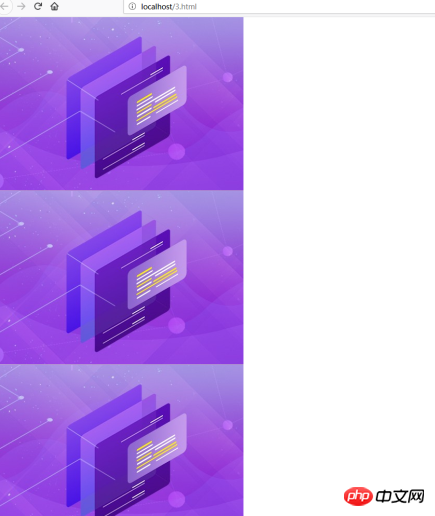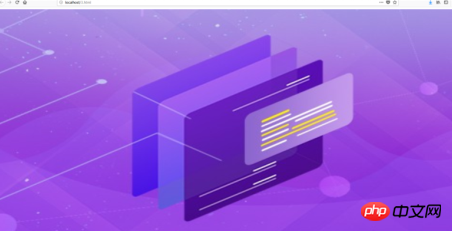 Web Front-end
Web Front-end
 CSS Tutorial
CSS Tutorial
 How to add a background image in html and make the image tile the entire page? (code example)
How to add a background image in html and make the image tile the entire page? (code example)
How to add a background image in html and make the image tile the entire page? (code example)
Some website pages will be more eye-catching if they add good-looking background images, but how should we set the background image of the web page? And they are usually required to display the tiled display effect of html background images. This should not be difficult for friends who have a little knowledge of html/css. So this article is mainly for novice friends to introduce in detail how to add and use HTML background images. For your reference.
1. HTML background image horizontal tile code example:
<style type="text/css">
body{
font-size:12px;
font-family:"宋体";
background-image:url(2.png);
background-repeat:repeat-x;
COLOR: #0C2B30;
}
</style>The effect is as follows:

2. Code example for vertical tiling of html background image:
body{
font-size:12px;
font-family:"宋体";
background-image:url(2.png);
background-repeat:repeat-x;
COLOR: #0C2B30;
}The effect is as follows:

3. Full screen html image Code example:
html,body{
width: 100%;
height: 100%;
}
.mui-content{
background: url(2.png) bottom center no-repeat #efeff4 ;
background-size: 100% 100%;
width: 100%;
height: 100%;
}The effect is as follows:

So the above summarizes for you how to let html set background images and html background tiles and other related knowledge. Hope it helps friends in need.
Note:
background shorthand property sets all background properties in one statement.
The background-size attribute specifies the size of the background image.
The background-repeat property sets whether and how to repeat the background image. The default background image repeats horizontally and vertically.
The background-image attribute sets the background image for the element. The background of an
element occupies the entire size of the element, including padding and borders, but not margins. By default, the background image is placed in the upper left corner of the element and repeats horizontally and vertically.
The above is the detailed content of How to add a background image in html and make the image tile the entire page? (code example). For more information, please follow other related articles on the PHP Chinese website!

Hot AI Tools

Undresser.AI Undress
AI-powered app for creating realistic nude photos

AI Clothes Remover
Online AI tool for removing clothes from photos.

Undress AI Tool
Undress images for free

Clothoff.io
AI clothes remover

Video Face Swap
Swap faces in any video effortlessly with our completely free AI face swap tool!

Hot Article

Hot Tools

Notepad++7.3.1
Easy-to-use and free code editor

SublimeText3 Chinese version
Chinese version, very easy to use

Zend Studio 13.0.1
Powerful PHP integrated development environment

Dreamweaver CS6
Visual web development tools

SublimeText3 Mac version
God-level code editing software (SublimeText3)

Hot Topics
 1655
1655
 14
14
 1414
1414
 52
52
 1307
1307
 25
25
 1254
1254
 29
29
 1228
1228
 24
24
 Google Fonts Variable Fonts
Apr 09, 2025 am 10:42 AM
Google Fonts Variable Fonts
Apr 09, 2025 am 10:42 AM
I see Google Fonts rolled out a new design (Tweet). Compared to the last big redesign, this feels much more iterative. I can barely tell the difference
 How to Create an Animated Countdown Timer With HTML, CSS and JavaScript
Apr 11, 2025 am 11:29 AM
How to Create an Animated Countdown Timer With HTML, CSS and JavaScript
Apr 11, 2025 am 11:29 AM
Have you ever needed a countdown timer on a project? For something like that, it might be natural to reach for a plugin, but it’s actually a lot more
 HTML Data Attributes Guide
Apr 11, 2025 am 11:50 AM
HTML Data Attributes Guide
Apr 11, 2025 am 11:50 AM
Everything you ever wanted to know about data attributes in HTML, CSS, and JavaScript.
 How to select a child element with the first class name item through CSS?
Apr 05, 2025 pm 11:24 PM
How to select a child element with the first class name item through CSS?
Apr 05, 2025 pm 11:24 PM
When the number of elements is not fixed, how to select the first child element of the specified class name through CSS. When processing HTML structure, you often encounter different elements...
 Why are the purple slashed areas in the Flex layout mistakenly considered 'overflow space'?
Apr 05, 2025 pm 05:51 PM
Why are the purple slashed areas in the Flex layout mistakenly considered 'overflow space'?
Apr 05, 2025 pm 05:51 PM
Questions about purple slash areas in Flex layouts When using Flex layouts, you may encounter some confusing phenomena, such as in the developer tools (d...
 A Proof of Concept for Making Sass Faster
Apr 16, 2025 am 10:38 AM
A Proof of Concept for Making Sass Faster
Apr 16, 2025 am 10:38 AM
At the start of a new project, Sass compilation happens in the blink of an eye. This feels great, especially when it’s paired with Browsersync, which reloads
 How We Created a Static Site That Generates Tartan Patterns in SVG
Apr 09, 2025 am 11:29 AM
How We Created a Static Site That Generates Tartan Patterns in SVG
Apr 09, 2025 am 11:29 AM
Tartan is a patterned cloth that’s typically associated with Scotland, particularly their fashionable kilts. On tartanify.com, we gathered over 5,000 tartan
 In front-end development, how to use CSS and JavaScript to achieve searchlight effects similar to Windows 10 settings interface?
Apr 05, 2025 pm 10:21 PM
In front-end development, how to use CSS and JavaScript to achieve searchlight effects similar to Windows 10 settings interface?
Apr 05, 2025 pm 10:21 PM
How to implement Windows-like in front-end development...



